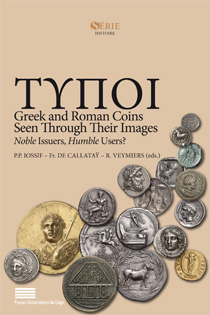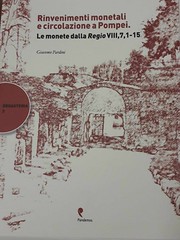
PREV ARTICLE
NEXT ARTICLE
FULL ISSUE
PREV FULL ISSUE
BOOK REVIEWS: ANCIENT COINS IMAGES, POMPEIITwo numismatic books were reviewed in CoinsWeekly articles this week, one on coins excavated in Pompeii. The other is a
proceedings of a conference devoted to understanding images on ancient coins which addresses an number of interesting questions surrounding the
creation and use of coins in ancient times. Here's information from the publisher's web sites. -Editor
Greek and Roman Coins Seen Through Their Images Proceedings of the International Conference Organized by the Belgian and French Schools at Athens, 26-28 September 2012 par P.P. IOSSIF, Fr. DE CALLATAŸ, R. VEYMIERS (eds.)
More precisely, this book explores the relation between “issuer” and “user” by addressing various points. Were numismatic types chosen and adapted for particular audiences? If so, then how is it that the iconography, bearing a religious character in most of the cases, does not correspond to those we imagine being the primary beneficiaries, i.e., soldiers and traders? What is the actual circulation of monetary images? What are the differences and similarities with respect to the images produced in other media of similar or distant sizes and qualities, gems and seals being similar, vases and sculptures being distant? To what extend did the issuers draw on media other than coinage for their iconographic ideas? Could users understand the “message” without the mediation of other media? In which way did numismatic imagery influence (or was it influenced by) the iconographic types and choices on other media? Which concepts and tools coming from different fields of research (anthropology for instance) are likely to help our understanding of the type-choice process? Are numismatic types over-commented by art historians (eager to use the term “propaganda”) and under-commented by economists (more imbued with pragmatism)? To what extent did the indispensable confidence of the users determine the use of images easily recognizable by them? Who decides the monetary iconography: the highest authorities or, as in the case of Republican Rome, junior aediles? Who’s responsible for the numismatic type: the coin engraver or the artist creating the original design? These are some of the questions addressed in this book and answered by leading specialists through new lenses and perspectives focusing on visual culture. That's a lot of questions for one book! But that's why it takes a conference full of experts to work them out. Hard
evidence from ancient times is scarce, so a lot of hard detective work is required. I'll be curious to know what readers think about the
book's conclusions. -Editor
For more information, or to order, see: To read the CoinsWeekly article, see: Rinvenimenti monetali e circolazione a Pompei Rinvenimenti monetali e circolazione a Pompei.Le monete della regio VIII,7,1-15 ISBN 978-88-87744-77-4 ERGASTERIA è una collana di “Studi di Archeologia” del Dipartimento di Scienze del Patrimonio Culturale (Beni e Attività Culturali, Filosofi a, Fonti, Testi, Territorio) For more information, or to order, see: To read the CoinsWeekly article, see: Wayne Homren, Editor The Numismatic Bibliomania Society is a non-profit organization promoting numismatic literature. See our web site at coinbooks.org. To submit items for publication in The E-Sylum, write to the Editor at this address: whomren@gmail.com To subscribe go to: https://my.binhost.com/lists/listinfo/esylum All Rights Reserved. NBS Home Page Contact the NBS webmaster 
|

